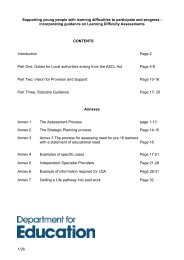Free download of:Excellence in English - Department for Education
Free download of:Excellence in English - Department for Education
Free download of:Excellence in English - Department for Education
Create successful ePaper yourself
Turn your PDF publications into a flip-book with our unique Google optimized e-Paper software.
Good-quality oral work, <strong>in</strong>clud<strong>in</strong>g well-planned group work, engages<br />
reluctant pupils and yields benefits <strong>in</strong> all areas <strong>of</strong> <strong>English</strong> work<br />
150. This was a key theme that ran through several <strong>of</strong> the earlier case studies,<br />
<strong>in</strong>clud<strong>in</strong>g the case study <strong>of</strong> St Thomas <strong>of</strong> Canterbury Primary School, with its<br />
focus on role play and develop<strong>in</strong>g pupils’ speak<strong>in</strong>g and listen<strong>in</strong>g skills. The<br />
importance <strong>of</strong> a rich and well-planned curriculum <strong>for</strong> talk <strong>in</strong> the Early Years<br />
Foundation Stage was highlighted <strong>in</strong> the case studies <strong>of</strong> Jump Primary School<br />
and St Thomas’s Primary School. The use <strong>of</strong> structured group work and debates<br />
enhances the quality <strong>of</strong> teach<strong>in</strong>g at St Paul’s Academy. Carefully planned group<br />
work that enables pupils to take a lead <strong>in</strong> learn<strong>in</strong>g was also described <strong>in</strong> the<br />
case study <strong>of</strong> George Eliot Junior School.<br />
151. The <strong>English</strong> at the crossroads report identified some <strong>of</strong> the issues with speak<strong>in</strong>g<br />
and listen<strong>in</strong>g <strong>in</strong> <strong>English</strong> lessons. Because a lot <strong>of</strong> talk occurs naturally <strong>in</strong> <strong>English</strong><br />
classrooms, too little attention is <strong>of</strong>ten given to plann<strong>in</strong>g a progressive<br />
curriculum <strong>in</strong> speak<strong>in</strong>g and listen<strong>in</strong>g <strong>for</strong> pupils that develops skills systematically<br />
from year to year. The importance <strong>of</strong> planned group work, where all pupils are<br />
given clear roles so that none becomes a passenger, has already been stressed<br />
<strong>in</strong> this report. Good-quality use <strong>of</strong> drama was also a feature <strong>of</strong> several <strong>of</strong> the<br />
most effective schools <strong>in</strong>cluded <strong>in</strong> this survey.<br />
152. Like many others, Castle View Primary School recognises that its pupils enter<br />
school lack<strong>in</strong>g confidence <strong>in</strong> speak<strong>in</strong>g. The headteacher has a firm belief <strong>in</strong> the<br />
important contribution to be made by subject specialists and regularly employs<br />
artists and musicians to work with children. The <strong>in</strong>itial approach with drama<br />
was through the idea <strong>of</strong> ‘a play <strong>in</strong> a day’ where an actor worked with a group <strong>of</strong><br />
pupils to produce a play to be per<strong>for</strong>med at the end <strong>of</strong> the day. This approach<br />
has been extended. The school now employs a local actor to work with pupils<br />
<strong>for</strong> around 20 days a year. She spends several days work<strong>in</strong>g with all <strong>of</strong> the Key<br />
Stage 2 classes, sourc<strong>in</strong>g Shakespeare texts or familiar stories such as Rob<strong>in</strong><br />
Hood. She also works with some <strong>of</strong> the younger children and <strong>of</strong>ten writes short<br />
plays specifically <strong>for</strong> them. She plays drama games and develops other skills<br />
such as improvisation, mime and movement. At the end <strong>of</strong> the year, the school<br />
puts on a <strong>for</strong>mal production <strong>for</strong> parents mak<strong>in</strong>g use <strong>of</strong> her work throughout the<br />
year and giv<strong>in</strong>g key roles to the older pupils.<br />
153. The school believes that this drama work makes a significant difference to its<br />
pupils’ self-confidence and oral abilities. Pupils do a great deal <strong>of</strong> collaborative<br />
work but are also expected to learn their l<strong>in</strong>es and per<strong>for</strong>m be<strong>for</strong>e a wider<br />
audience. Other theatre skills, such as light<strong>in</strong>g and costume-mak<strong>in</strong>g, are also<br />
employed to support the production and generate high-quality outcomes. The<br />
drama work is also fully <strong>in</strong>tegrated with<strong>in</strong> other <strong>English</strong> work <strong>in</strong> the school. For<br />
example, teachers <strong>in</strong>troduce pupils to the texts be<strong>for</strong>e they are to work with the<br />
actor. As a result, they have already discussed aspects <strong>of</strong> characterisation and<br />
context be<strong>for</strong>e the drama session.<br />
52<br />
<strong>Excellence</strong> <strong>in</strong> <strong>English</strong>: what we can learn from 12 outstand<strong>in</strong>g schools<br />
May 2011, No. 100229
















